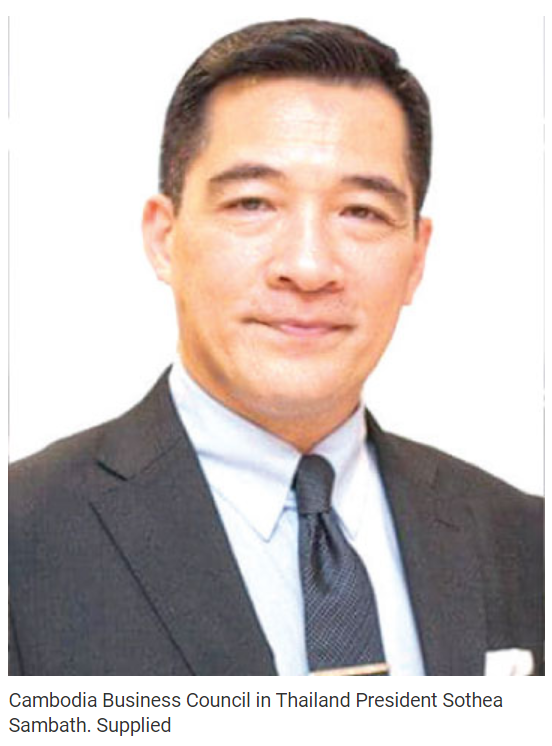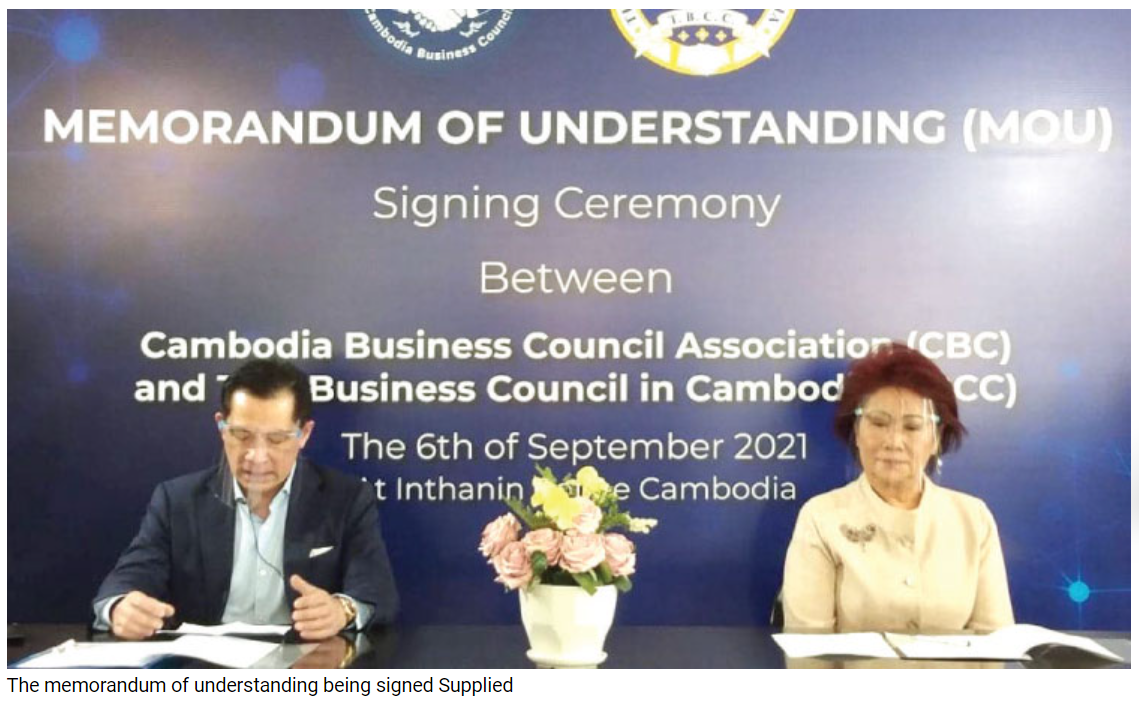Tourists soon to be allowed into Cambodia, Thailand says
The Cambodia Business Council in Thailand (CBC) says it is hoping to hear from the government as early as this month about visa changes that could come into force soon. They would first allow tourists to visit Sihanoukville before the Kingdom is fully opened to foreign visitors, according to CBC’s president Sothea Sambath.
CBC Thailand is a collection of entrepreneurs who work closely with the Cambodian embassy in Bangkok to promote bilateral trade and investment. It has adopted the “economic diplomacy” strategy suggested by Cambodia’s Foreign Affairs Ministry, forging links with Thai business associations and local companies.
Sambath spoke with Khmer Times reporter Michael Firn about the challenges caused by the Coronavirus pandemic and the opportunities expected when Covid-19 eases.
KT: CBC Thailand launched in Bangkok in May. What are your main achievements since then?
SS: We would like to be a one-step service and a one-step window to businesspeople and we get support from the royal embassy. We’re just here to support Cambodia’s strategy of bilateral trade, culture and tourism.
The CBC has been registered with the Ministry of Interior in Thailand, so fully recognised by the Thai government. Immediately after my election [in May] we have signed a memorandum of understanding (MoU) with one of the biggest Thai organisations called Thai Subcon [Thai Subcontracting Promotion Association], with about 500 members. They cover Thai tech and industry channels so all the big players are members of this association. We decided to exchange information, marketing together, trying to bring businesspeople to Cambodia and Cambodian businesspeople to Thailand. This is really important because Cambodia has been trying to follow what we call Industry 4.0 and this is the perfect partner because CBC is a bridge between different channels and investors to Cambodia and vice versa. We want to partner with different projects. It could be vocational training, exchange of skills when it comes to the automotive industry, hospitality or any manufacturing. This is the main MoU we signed in June after we got all our board members elected.
We also joined with the Thai Business Council in Cambodia (TBCC). We get support when it comes to networking, meetings with local authorities. We complement each other. If they come directly to Cambodia without knowing about it, they can contact us in Bangkok and it’s not easy at the moment to travel to Cambodia so they can get information directly from our office in Bangkok. In November we’re going to have a business matching with TBCC, probably online because of the Covid situation. We’re also going to have other MoUs with different associations, especially in Cambodia, to bring businesspeople to Thailand and facilitate their entry to the Thai market or getting the right partner or advising when it comes to products.
KT: How will the reopening of Bangkok to foreigners help trade and what are your hopes for Cambodia opening up its airports?

SS: The example we can take from our partners in Thailand is to reopen the borders to tourists. The advantage Cambodia has is having one of the highest rates of vaccinated people. Now we need to think about how we’re going to bring the first tourists. The Thai government came up with the “sandbox” in Phuket and Koh Samui. I don’t want to speak on behalf of the Cambodian Ministry of Tourism but I think it’s coming soon. There will be a proposal for opening the border to tourists probably by the end of this month from the Ministry of Tourism on how people can visit a precise location which is Sihanoukville. There will be a trial area and so we are probably following the same example as Thailand. Once we reopen the border like this, I think it’s going to be very positive because in our office we receive many demands from businesspeople to come and survey the market in Cambodia.
KT: Thai retailers have been eyeing expansion in Cambodia with CP-Group’s 7-Eleven opening its first store in Phnom Penh and Big C Supercenter Plc planning to open enough stores in the next five years to make it the biggest retailer in Cambodia. What is attracting Thai retailers to the country and who else is likely to follow?
SS: The CBC is working on an MoU with these big retailers for Cambodian products coming to Thailand but let’s talk about Cambodia. It’s wonderful because Cambodian people before Covid used to travel to Thailand just to shop and come back with big brands such as Big C and 7-Eleven. For them it’s the right timing now to come to Cambodia because they’ve been to Vietnam already and been quite successful, even the Central Group in Vietnam. Now it’s time to come to Cambodia. The market is ready. After a long survey they understood the potential and their brands are so well-known among Cambodian people, especially during Covid when the average Cambodian cannot afford to travel to Thailand.
I spoke with Big C. They have very precise plans to expand in Phnom Penh, Sihanoukville and Cambodia as a whole. We really encourage this. The Cambodian people are very keen to see these brands coming.
KT: Cambodia’s exports to Thailand halved last year and were nearly 100 percent agricultural products. What’s your sense of how this year and next year will compare?
SS: The closing of the borders affected our bilateral trade quite significantly especially after the emergence of the Delta variant. Now that people have been vaccinated and Thailand’s going to reopen its borders, we’re quite optimistic to see a rebound in terms of trading between both countries, not only agricultural products but all sectors, the different commodities, hospitality. Also with these big retailers coming we’re going to see increasing imports and the exchange between both countries. I’m quite optimistic not only for Q3 [the third quarter] but also the start of 2022.
We will have nearly 100 percent of people vaccinated in the new normal and I’d like to see a new way of thinking. What we call the digitalisation of trading. We’re going to fund a new digital trade platform. This is something that the CBC is working on, to bring Cambodian products into the Thai market and vice versa. We’re bringing people together with these products. That is something new, it’s still an embryo at the moment, but it’s something we’re working on because it is part of the new normal.
KT: Cambodia’s embassy in Thailand held an event this month on technology and innovation. Thai participants talked of how every village has broadband, there’s a technology corridor and plans to lay submarine cables to speed up connectivity with the rest of the region. How well is Cambodia placed in terms of infrastructure to make the most of the new economy?
SS: It’s been two years since the start of the pandemic. We all faced hardship but what did we learn from it and how are we going to live with it? What we learned, and that is why we decided to start the CBC, is that we need to work with each other and help each other. Because of the pandemic we cannot tie directly with Europe, North America, other countries that are far from us. We need to look at our neighbours and, for my part, that’s Thailand. So we learned to work together and CBC is the bridge, a small bridge but we started building something together.
In terms of e-commerce they are far ahead of us and that’s what we need to learn from our Thai counterparts, to develop the technology, broadband to villages. That’s why I think it’s time to move together onto a platform because everyone is using a smartphone in Cambodia. We can use our Thai counterparts to help us when it comes to skills, to sharing experience and that’s part of CBC’s mission when it comes to sharing skills and information. We’re optimistic for the future to work closely with our government and the Thai government to work out how to move quickly, not to the same level but at least half of what Thailand has reached. That’s what it takes when it comes to points of sales and e-commerce platforms. Right now it’s increasing in Cambodia but not completely organised. One of the missions we need to accomplish is to have this trading platform together especially when it comes to Cambodian products because our farmers produce sugar cane, Kampot pepper, so we can access the market directly in Thailand without going physically to demonstrate or showcase our different products.
Source: https://www.khmertimeskh.com/50938102/tourists-soon-to-be-allowed-into-cambodia-thailand-says/


 English
English




